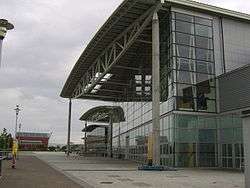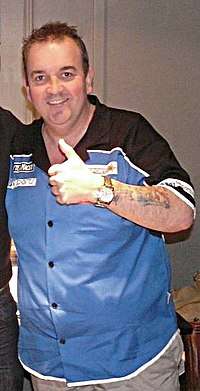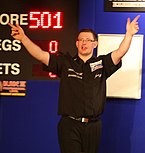Jocky Wilson Cup
The Jocky Wilson Cup (officially the PartyPoker.com Jocky Wilson Cup for sponsorship) was a professional darts team tournament that took place at the Braehead Arena in Glasgow, Scotland on 5 December 2009. It was the last of eight non-ranking Professional Darts Corporation (PDC) events of the 2009 season, and was a one-off tournament named after Jocky Wilson, the two-time world darts champion. The tournament was contested by two nations of two players each with the winner being the first country to earn four points over a five-match series: four singles fixtures and one doubles game.
| Jocky Wilson Cup | |
|---|---|
| Tournament information | |
| Dates | 5 December 2009 |
| Venue | Braehead Arena |
| Location | Glasgow |
| Country | |
| Organisation(s) | PDC |
| Format | Legs |
| High checkout | 168 |
| Champion(s) | |
Phil Taylor and James Wade of England won the competition, whitewashing their opponents Gary Anderson and Robert Thornton of Scotland 6–0. Wade won the first game against Anderson 6–4 and Taylor beat Thornton 6–0 in the second. Taylor and Wade defeated Anderson and Thornton in the doubles match 6–2 for overall victory with the duo winning their final two singles matches 6–4 over their Scottish opponents. Wade achieved the tournament's highest checkout, a 168, in the second leg of his singles game against Thornton.
Background and format

The Jocky Wilson Cup was launched in August 2009 by the Professional Darts Corporation (PDC) and was named after Jocky Wilson, the two-time world darts champion. Wilson consented to the tournament, which had a similar format to tennis' Davis Cup.[1] The tournament was held on 5 December at the Braehead Arena in Glasgow, Scotland,[2] and was the last of eight non-ranking PDC-sanctioned events in the 2009 season.[3] It was sponsored by the online gambling company PartyPoker.com, and broadcast on Sky Sports 2 in the United Kingdom and on the PDC's website.[2][4] Two nations of two players each contested the tournament: Robert Thornton and Gary Anderson for Scotland and Phil Taylor and James Wade for England.[lower-alpha 1][1][6]
There were five matches in the Cup: four 501 singles matches and one 1001 doubles game.[lower-alpha 2] All games were best-of-11 legs with the first to six winning and there were no tie-breaks. If the doubles match was tied at 3–3, the team with the most maximum scores or the one whose player made the first maximum was declared the winner.[7] One point was awarded to the winners of each of the four singles games and two to the winning team of the doubles fixture. The country to be the first to earn four points won the tournament.[1][5]
Bookmakers installed England as the favourites to win the event.[2] Thornton, the 2009 Players Championship Finals runner-up, said to play in Glasgow against England would possibly be the high point of his career and was looking forward to it. Anderson said he liked the challenge of playing Taylor and Wade due to their form. Taylor commented it would be desirable to win the tournament and dedicate it to Wilson, and Wade said his match against Anderson had the potential to establish the overall mood.[4] The broadcaster Sid Waddell opined that Taylor would not treat the event as an exhibition and did not foresee England winning all five matches.[8]
Tournament summary
All matches were held on the evening of December 5.[7] Anderson played Wade in the opening match of the competition. Anderson took 20 minutes to build a 4–0 lead from checkouts of 96 and 118 and a double five finish. He missed four targets in leg five and allowed Wade to attain a 85 checkout on the bullseye ring and claim his first leg.[9] After the interval, Wade twice finished on the double ten ring to go 4–3 behind and tied at 4–4 on the double 12 ring after Anderson missed the double 20 ring. Wade used misses from Anderson at the bullseye and double 16 rings to take the lead and secured a 6–4 win on the double 10 ring.[10] Wade said post-match he was "really lucky" to have won because he had missed his targets in the first four legs and felt he would have lost had Anderson went five legs ahead.[10]
The second match was contested by Taylor and Thornton. Finishes on the double eight and two rings won Taylor the first two legs after Thornton was unable to hit two of the double rings in the second. A 78 checkout put Taylor three legs in front, and followed by finishing on the double eight ring in leg four after Thornton twice failed to hit the double 18 ring. Finishes on double 16 and 10 allowed Taylor to whitewash Thornton 6–0. Taylor commented that Thornton had not played to the best of his ability and England were under pressure to finish the task.[10]
The doubles match was the next to be held. Anderson made a maximum score to setup a 59 checkout for Thornton to win the first leg for Scotland. A maximum score and a double 20 finish from Wade won England leg two and it took the lead when Wade made an 88 checkout after Thornton missed the double 18 ring. Wade was twice unable to claim leg four but Thornton missing the double 20 ring allowed him to take a 3–1 lead for England. He extended the nation's lead by one leg on the double ten ring before two maximum scores and a double six finish from Thornton won Scotland leg six. He missed the double 20 ring for a 116 checkout and Wade hit the double 16 ring to put England another leg ahead. England won the match 6–2 and the Cup with Taylor's finish on the double 18 ring.[10] Wade commented on England's overall win: "It's brilliant but the match isn't over yet and it would be great to win the final two games too. Gary and Robert will be playing for pride and I'm sure they'll do a job in the last two games."[10]
Wade met Thornton in the fourth game. Thornton won the first leg on a 95 checkout and Wade tied on the next leg with a 168 checkout on the double 12 ring. Wade took the third leg after Thornton failed to complete a 156 checkout. Thornton produced a 106 checkout to again go level on leg four before Wade made an 11-dart finish to retake the lead in the fifth leg. Wade missed the double 12 ring three times and Thornton won leg six on the double 20 ring. Checkouts of 90 and 160 provided Wade with a clear lead until Thornton won a fourth leg with a finish on the bullseye ring for a 121 checkout. Thornton made a maximum score in leg ten before Wade finished on the double 14 ring to take a 6–4 victory.[10]
Anderson and Taylor played the final match. Anderson took the opening leg on the double four ring after Taylor failed to complete a 135 checkout on the bullseye ring. A 96 checkout from Taylor in leg two tied the game before Anderson finished on the double 20 ring in the third leg. Taylor took leg four with a 68 checkout when Anderson missed the bullseye ring and the fifth from 11 dart throws for a clear lead. He took the sixth leg and Anderson the seventh on the double 20 ring after Taylor missed the bullseye for a 161 checkout. A 13-dart finish won Taylor leg eight and Anderson the ninth on the double 16 ring.[10] In the tenth leg, Taylor finished on a double following 10 dart throws to beat Anderson 6–4 and complete England's 6–0 whitewash of Scotland.[9][10]
Post-tournament
Taylor said he was pleased to have won the tournament, adding: "Jocky's a legend so to win the first event staged in his name is fantastic. Robert came back brilliantly from losing 6-0 and Gary was superb, but James showed his quality. It was great fun."[11] Wade observed the crowd booing the English team, which he said had no effect on him or Taylor.[9] He added, "we did the job that we came to Glasgow to do, so all in all, a good night all round."[9] Thornton commented on Scotland's defeat: "Both myself and Gary missed too many doubles but it was a really enjoyable experience. You're never a loser with support like this and hopefully we can give them plenty to cheer in the future."[11]
Giles Smith of The Times called the competition "a pioneering and, you would have to say, pretty ambitious attempt to reconjure the broiling patriotic fervour and all-out historical needle that used to accompany the old home international football matches between England and Scotland, except with darts."[6] This was the only time the Jocky Wilson Cup was staged as the tournament became the PDC World Cup of Darts in 2010.[12]
Draw
Scotland |
5 December 2009[9][10] | England | |||||||||||||||||||||||||||||||||||||||||||||||||||||
|---|---|---|---|---|---|---|---|---|---|---|---|---|---|---|---|---|---|---|---|---|---|---|---|---|---|---|---|---|---|---|---|---|---|---|---|---|---|---|---|---|---|---|---|---|---|---|---|---|---|---|---|---|---|---|---|
| 0 | Points | 6 | |||||||||||||||||||||||||||||||||||||||||||||||||||||
| |||||||||||||||||||||||||||||||||||||||||||||||||||||||
Notes
References
- Gilmour, Rod (27 August 2009). "England and Scotland set for oche in darts' first Jocky Wilson Cup". The Daily Telegraph. Archived from the original on 25 May 2010. Retrieved 19 July 2020.
- Davies, Steve (5 December 2009). "England look deserving Jocky jollies; Jocky Wilson Cup Sky Sports 2, 7pm". The Racing Post. p. 109. Retrieved 5 December 2009 – via Gale OneFile: News.
- "2009 PDC Darts Event Calendar". Darts Database. Archived from the original on 8 June 2020. Retrieved 17 July 2020.
- "Jocky Wilson Cup Preview". Professional Darts Corporation. 5 December 2009. Archived from the original on 7 December 2009. Retrieved 19 July 2020.
- "Old foes on the oche; More live darts on Sky Sports with Jocky Wilson Cup announced". Sky Sports. 27 August 2009. Archived from the original on 30 August 2009. Retrieved 19 July 2020.
- Smith, Giles (8 December 2009). "Cup runneth over to bring soaking for The Power". The Times. p. 75. Retrieved 19 July 2020 – via Gale Academic OneFile.
- "Jocky Wilson Cup Format". Professional Darts Corporation. 25 November 2009. Archived from the original on 27 November 2009. Retrieved 19 July 2020.
- Waddell, Sid (2 December 2009). "Scottish power; Battle of Britain will recall the good old days". Sky Sports. Archived from the original on 7 December 2009. Retrieved 19 July 2020.
- Pyke, Stuart (5 December 2009). "Taylor and Wade sweep England to Victory". Unicorn Darts. Archived from the original on 18 July 2012. Retrieved 19 July 2020.
- "England Win Jocky Wilson Cup". Professional Darts Corporation. 6 December 2009. Archived from the original on 8 December 2009. Retrieved 19 July 2020.
- "England whitewash Scots; Glasgow crowd fail to lift home heroes to victory". Sky Sports. 6 December 2009. Archived from the original on 8 December 2009. Retrieved 19 July 2020.
- "Dart Turniere – Jocky Wilson Cup" [Darts tournaments – Jocky Wilson Cup] (in German). dartn.de. Archived from the original on 19 July 2020. Retrieved 19 July 2020.

